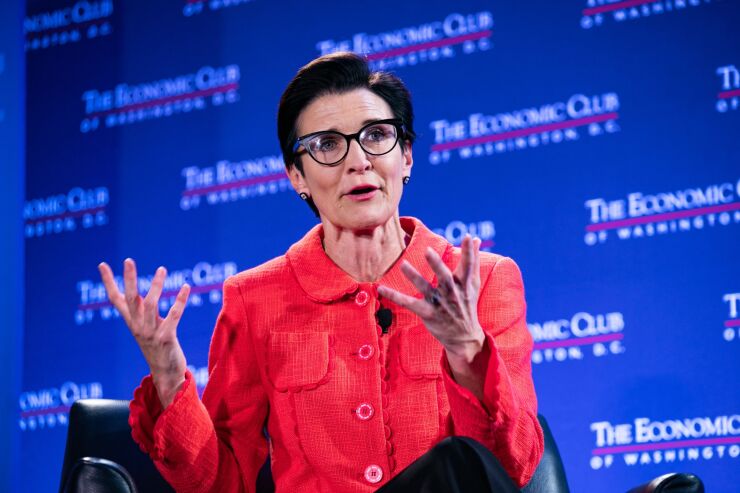
Citigroup CEO Jane Fraser had a clear message Friday for skeptics of the megabank's massive organizational overhaul and its ambitious financial targets: We won't quit until it's all done.
The
For years, the company's profitability metrics have trailed its big-bank peers. Under Fraser's guidance, the company is aiming for an efficiency ratio of less than 60%, a common equity tier 1 capital ratio of 11.5% to 12% and a return on tangible common equity ratio of 11% to 12%.
"This is a relentless execution," she told analysts. "We're getting a lot done. We don't pretend we're at the end of the road there — we're not there yet — but we're getting done what we said we'd do and building up those proof points so that you can see us achieve those return targets."
It's been exactly one month since Fraser unveiled the organizational revamp. It is designed to give her more control over Citi's five core businesses, while also cutting out management layers, eliminating duplicative workstreams and speeding up the company's decision-making.
The leaders of the five core businesses — markets, business banking, wealth management, U.S. personal banking as well as treasury, trade and securities services — now report directly to Fraser and belong to the executive management team.
The overhaul, which coincides with Citi's exit from 14 overseas consumer franchise businesses, is set to include huge job cuts, including the elimination of certain regional managers. Citi completed the sale of its consumer business in Taiwan in the third quarter, and last week it confirmed that it would sell its consumer wealth management unit in China to HSBC.
Details about how many jobs are being axed, and how much the company will save by doing so, will be shared in January during Citi's fourth-quarter earnings call, Fraser said. She reiterated that the changes will "cascade" through the company "at pace," with the reductions of the top two layers of management taking place in September, the next set of reductions rolling out around mid-November and the remaining eliminations to be implemented by early next year.
Cost-cutting isn't a major driver for the overhaul, but the changes will help with "bending the expense curve" by late 2024, Fraser said. "And at the end of the work, we will have a simpler firm that can operate faster, better serve our clients and unlock value for our shareholders."
Since her promotion to chief executive officer of $2.4 trillion-asset Citigroup in March 2021, Fraser has taken several decisive steps to simplify and modernize the sprawling megabank.
The company has reduced headcount by about 7,000 so far this year, bringing year-to-date severance charges to around $600 million, Chief Financial Officer Mark Mason said Friday. He declined to say how many total employees Citi aims to have after the reorganization, but he did note that the company's ongoing risk management transformation will eliminate jobs as well.
As of Dec. 31, 2022, Citi employed about 240,000 people, according to a regulatory filing.
Citi has been engaged in the transformation for three years now, following
For the third quarter, Citi spent about $3 billion on technology, Mason noted.
"Undoubtedly the technology investment, the automation that we're putting in place, the straight-through processing that occurs, the fewer reconciliations that are required, the streamlining from all of those layers that Jane mentioned we'll be eliminating, all of those things will also work to reduce headcount as well," Mason said. "So while we're investing and hiring on the front end to capture the upside as markets turn [and] also as we position ourselves to grow with clients, we're also going to realize efficiencies that come out of headcount reduction."
On Friday, Citi reaffirmed its full-year guidance on revenues and expenses. The $2.4 trillion-asset company expects revenues to land somewhere between $78 billion and $79 billion, while expenses should total around $54 billion. It increased its guidance for net interest income to at least $47.5 billion, excluding markets, based on real and projected interest rate trends.
Citi reported net income of $3.5 billion and earnings per share of $1.63 for the third quarter, which topped the average estimate of $1.23 from analysts surveyed by FactSet Research Systems.
Citi's stock price is down about 8% for the year. It closed Friday roughly flat for the day.






